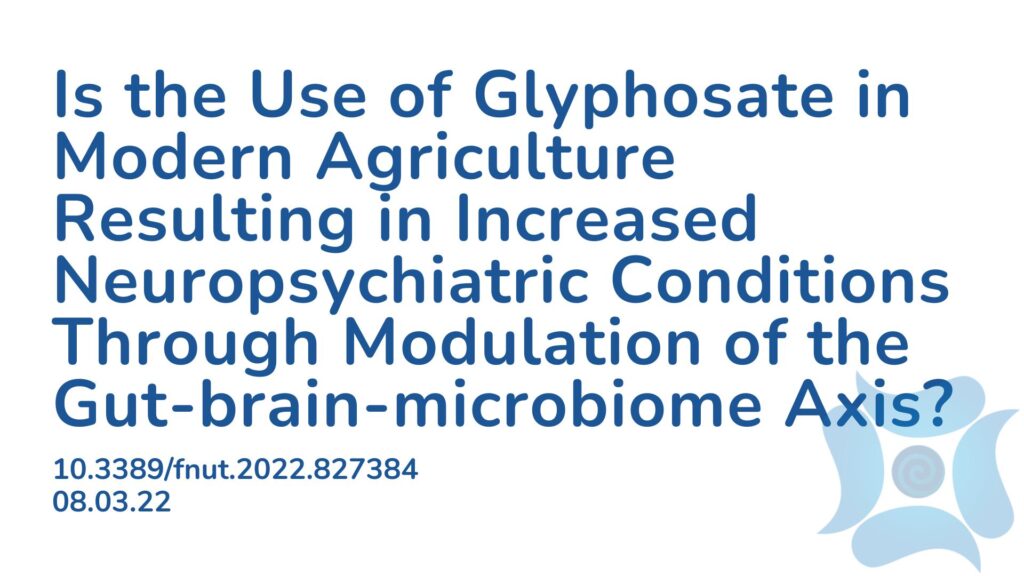Summary: This perspective article weighs in on the current evidence on glyphosate exposure and its impact on the gut microbiome and in turn, the brain and neuropsychiatric conditions. Over the past 30 years, there has been higher glyphosate residues found within food. Recently, links between the brain and the intestinal microbiome have been discovered and explored, showing that the gut-brain axis provides a mechanism by which diet can influence mental health. Alterations to the gastrointestinal microbiome have been associated with multiple neuropsychiatric conditions including anxiety, depression, Alzheimer’s disease and Parkinson’s disease. Given that it is well established that glyphosate can kill commensal bacteria in the microbiome, exposure to glyphosate has the potential to negatively impact neurodevelopment indirectly through the gut-brain axis. Glyphosate entered the market due its broad-spectrum antimicrobial action which was viewed as beneficial for controlling plant pathogens. However, it has now made its way into the human diet at a much faster rate, which raises concerns regarding the gut microbiome and the way in which it influences human health. Glyphosate has also been shown to negatively impact the production of short chain fatty acids (SCFA), which are dietary carbohydrates that are metabolised by bacteria. The production of SCFAs play a critical role in maintaining intestinal barrier function, immune health and homeostasis. The production of SCFAs has also been linked to reduced instance of colon cancer. This perspective article is an interesting read and insight into the introduction, use and doses of glyphosate evident in our crops and food, as well as a comparison to the timeline of glyphosate load and incidence of mental health disorders. It concludes that overall, environmental exposure to glyphosate and glyphosate-based herbicides has the potential to negatively influence neurodevelopment and behavior across the life cycle, as well as future generations.
Abstract: Environmental exposure to glyphosate and glyphosate-based herbicides has the potential to negatively influence neurodevelopment and behavior across generations indirectly through the gut-brain-microbiome axis. Potential mechanisms by which glyphosate may elicit these effects are through the disruption of the normally symbiotic relationship of the host and the gut microbiome. Given glyphosate can kill commensal members of the microbiome like Lactobacillus spp., Ruminococaeae and Butyricoccus spp., resulting in reductions in key microbial metabolites that act through the gut-brain-microbiome axis including indoles, L-glutamate and SCFAs. Glyphosate- resistant microbes in the gut have the potential to increase the production of pro-inflammatory cytokines and reactive oxygen species which may result in increased HPA activation, resulting in increased production of glucocorticoids which have implications on neurodevelopment. In addition, maternal transfer of the gut microbiome can affect immune and neurodevelopment, across generations. This perspective article weighs the evidence for chronic glyphosate exposure on the gut microbiome and the potential consequences on the gut-brain axis correlated with increased incidence of neuropsychiatric conditions.
Article Publication Date: 08.03.22
DOI: 10.3389/fnut.2022.827384



